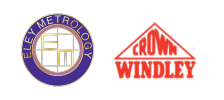Quality control is an aspect of manufacturing that helps to safeguard against poor performance and its consequences, such as reputation suffering, waste and higher costs. Metrology and other disciplines play a crucial role in ensuring that products produced are free from defects and that errors are detected and rectified as early as possible.
Every manufacturer suffers from systematic, random and gross errors. Quality control aims to minimise these errors and keep them within acceptable standards.
Standards and procedures, training, audits, and a culture that values quality all play a significant role in ensuring that quality is controlled and that high customer satisfaction is supported.
Clear Standards and Procedures
Standards and procedures are fundamental steps in improving quality control in manufacturing. In today’s world, frameworks and certifications are common practices to achieve compliance with standards and regulations. Examples are the ISO 9000 family for quality management. Proven methodologies such as Toyota’s 5S, Poka-Yoke, and Six Sigma also help achieve quality.
Defining what constitutes acceptable quality and the process by which it is achieved ensures consistency throughout the production lifecycle. Some useful tools can be used to guide all layers and functions within the manufacturer.
For example, visual aids such as charts, diagrams, and step-by-step guides can assist workers in understanding and adhering to standards. Documentation can be created and made easily accessible and regularly updated to reflect changes, such as in measurement techniques or standards.
Consistent training on these procedures ensures that all employees are aligned, reducing the likelihood of errors and defects.
Regular Training Programs
Regular training serves several purposes, including:
- Learning about equipment and updates. This is especially important, considering modern technology can quickly receive functional updates.
- Keeping up to date with the latest techniques
- Process consistency and standardisation
- Re-familiarisation
- Compliance with certification and regulation
It is also essential to ensure staff feel supported in their roles. Continuing Professional Development helps to achieve this. Training programs can also be great for feedback, with trainers and trainees benefiting from each other’s knowledge.
Various delivery methods can be employed in the workplace. This includes workshops, e-learning modules, and hands-on training sessions. Workshops and hands-on training provide practical experience with metrology equipment, for instance, while e-learning allows employees to learn at their own pace. Records can be used to log attendance.
Keeping training materials and methods current with industry standards ensures that the workforce remains competent in maintaining quality control.
Utilising Technology and Automation
Technology and automation are driving efficiency and productivity. For example, consider how the choice of measuring equipment makes a marked difference when aiming for accuracy and precision. Layer this with technology that offers enhanced precision and automation, and manufacturers begin to eliminate some of the human errors that have plagued them historically.
Repeated measurements then make a substantial contribution to quality, especially as the full potential of technology lends itself to quality control processes. For instance, automated inspection systems and sensors can detect measurement discrepancies more accurately and quickly than manual methods.
Precision measurement tools such as Coordinate Measuring Machines (CMM), laser scanners, and digital callipers can provide highly accurate and repeatable measurements. Couple this with software that utilises machine learning and artificial intelligence techniques, and it becomes viable to predict and identify potential quality issues based on measurement data before they become significant problems. Real-time data collection and analysis enable manufacturers to monitor product quality and make continuous, immediate adjustments.
Scheduled and ad-hoc management information becomes available as an essential aspect of data-driven decision-making that can be used to control improvement. Implementing software systems that track and analyse measurement data can highlight trends and areas that require improvement.
Auditing and Inspections
Audits and inspections provide the necessary checks to ensure compliance with standards and procedures. Internal audits are a valuable tool in the manufacturer’s toolbox for identifying areas for improvement within the company’s processes. In contrast, external audits objectively assess the manufacturing operations and may be part of a wider certified compliance scheme.
Random or scheduled inspections can ensure that products meet the defined standards before reaching customers. Technology now facilitates inline inspection, whereby the product inspection occurs on the production line at the earliest opportunity.
It is also essential to consider the importance of equipment inspection and calibration.
Foster a Culture of Quality
Leadership plays a significant role in fostering a culture of quality in an organisation. Getting employees’ buy-in will help ensure an environment that supports quality as a first-class citizen.
Practical steps such as using recognition and rewards with performance metrics and accountability can help. However, leading by example is always the most important.
Feedback from staff, procedures being followed, and a sense of care over the production process in conjunction with technology will offer more excellent quality products with low costs and increased customer satisfaction.

Jeff Eley is the founder and managing director of Eley Metrology, a leading company in the precision measurement industry. With decades of experience in metrology, Jeff has established himself as a respected figure in the field. Under his leadership, Eley Metrology has become renowned for its expertise in coordinate measuring machines (CMMs), digital height gauges, and granite metrology products. Jeff’s vision has driven the company to develop innovative solutions, including custom-designed CMMs and the flagship long-bore measurement machine (LBM). His commitment to excellence and customer-centric approach has positioned Eley Metrology as a trusted provider of high-precision measurement tools and services for industries such as aerospace, automotive, and manufacturing.



